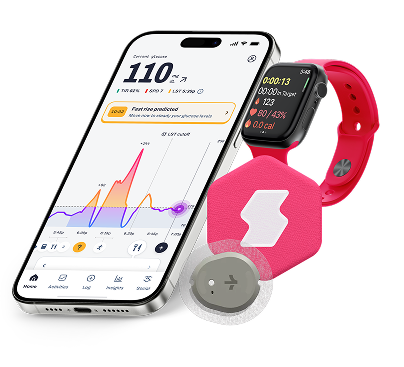Brussels sprout, those miniature cabbage-like vegetables, are gaining popularity for their unique flavor and potential impact on blood sugar levels.
In this comprehensive guide, we'll explore the often-overlooked glycemic index of Brussels sprout, shedding light on how they may be a valuable addition to the diets of individuals with type 2 diabetes.
Sign up to be the first to know about special offers and exciting Signos news.
Glycemic Index Table
The glycemic index (GI) of Brussels sprout is relatively low, with a value of around 32 when boiled and approximately 75 when roasted.¹ The GI measures how quickly a carbohydrate-containing food raises blood sugar levels. Foods with a lower GI are digested and absorbed more slowly, resulting in a slower and steadier increase in blood sugar.
For a serving size of 100 grams of boiled Brussels sprout, the carbohydrate content is approximately 8 grams. When calculating the glycemic load (GL) per serving, which takes into account both the GI and the carbohydrate content, we can use the formula:
GL = (GI x Carbohydrate content per serving) / 100
For boiled Brussels sprout:
GL = (32 x 8) / 100 ≈ 2.56
So, the glycemic load for 100 grams of boiled Brussels sprout is approximately 2.56.
For roasted Brussels sprout, the GI is higher (around 75), but the carbohydrate content remains approximately 8 grams. Using the same formula:
GL = (75 x 8) / 100 ≈ 6
The glycemic load for 100 grams of roasted Brussels sprout is approximately 6.
It's important to note that cooking methods can influence the GI of foods. Boiling results in a lower GI than roasting because it causes less starch gelatinization. This means that boiled Brussels sprout have a milder impact on blood sugar levels than roasted ones.
These values provide valuable information for individuals with diabetes or those looking to manage their blood sugar levels. Incorporating boiled Brussels sprout into meals may be a preferable choice for better glycemic control compared to roasted Brussels sprout.

Nutritional Facts
Brussels sprout are a nutritional powerhouse, boasting an impressive array of vitamins, minerals, and dietary fiber. They are particularly rich in vitamin K, providing over 100% of the recommended daily intake per 100-gram serving, which plays a crucial role in blood clotting and bone health. Additionally, Brussels sprout are a good source of vitamin C, vitamin A, folate, and various antioxidants, making them a valuable addition to a balanced diet.
The nutritional information below is for 100 g of Brussels sprout.²
Nutritional Facts

Are Brussels Sprout Good for Weight Loss?
For several reasons, Brussels sprout can be a valuable addition to a weight-loss diet. They are low in calories, with approximately 43 calories per 100-gram serving, making them a suitable choice for calorie-conscious individuals. Additionally, Brussels sprout are high in dietary fiber, promoting feelings of fullness and satiety and potentially reducing overall calorie intake. Moreover, they offer a wealth of essential vitamins and minerals, ensuring you receive essential nutrients while managing your weight.
Furthermore, Brussels sprout contain compounds like sulforaphane, which has been associated with potential anti-obesity effects by influencing adipose tissue and metabolism.⁴ ⁵
Incorporating Brussels sprout into a balanced diet emphasizing whole foods and mindful eating can be a beneficial strategy for weight management. However, it's important to remember that weight loss depends on overall dietary patterns and lifestyle choices.
Are Brussels Sprout Safe for People Living with Diabetes?
Brussels sprout can be a safe and beneficial addition to the diet of individuals with diabetes. They are low in carbohydrates and have a low glycemic index (GI), which means they have a minimal impact on blood sugar levels when consumed in moderation. Additionally, Brussels sprout are rich in dietary fiber, vitamins, and minerals, including vitamin K, vitamin C, and folate, which can support overall health and well-being.
Furthermore, Brussels sprout contain compounds like sulforaphane, which has shown potential in improving insulin sensitivity and reducing oxidative stress, which are important factors in managing diabetes.⁶
However, it's essential for individuals with diabetes to be mindful of portion sizes and cooking methods. Boiling or steaming Brussels sprout is preferable, as these methods have a lower GI than roasting. Additionally, it's important to consult with a healthcare provider or registered dietitian to incorporate Brussels sprout into a personalized diabetes management plan.
Better health starts here.
Sign up for tips and insights that work for you!
Allergies
While Brussels sprout are generally considered a healthy vegetable, some may experience allergic reactions. Allergic reactions to Brussels sprout can include symptoms such as hives, itching, swelling of the face, mouth, or throat, abdominal pain, nausea, vomiting, or even anaphylaxis in severe cases.³
It's important to note that Brussels sprout allergies are relatively rare. Still, individuals with a known allergy to other cruciferous vegetables like broccoli or cauliflower should exercise caution when consuming Brussels sprout.³

References
References
- The University of Sydney. (2023, May 1). Glycemic Index – Glycemic Index Research and GI News. https://glycemicindex.com/
- USDA Food Data Central. (2019, April 1). Food Details - Brussels sprout, cooked, boiled, drained, without salt. Retrieved from https://fdc.nal.usda.gov/fdc-app.html#/food-details/169971/nutrients
- Food Allergy Research & Education (FARE). (n.d.). Brussels sprout. https://www.foodallergy.org/common-allergens/brussels-sprout
- Sedlak, T. W., & Snyder, S. H. (2004). Bilirubin benefits: cellular protection by a biliverdin reductase antioxidant cycle. Pediatrics, 113(6), 1776–1782. https://doi.org/10.1542/peds.113.6.1776
- Houghton, C. A., Fassett, R. G., & Coombes, J. S. (2013). Sulforaphane: translational research from laboratory bench to clinic. Nutrition reviews, 71(11), 709–726. https://doi.org/10.1111/nure.12060
- National Institutes of Health. (2021). Cruciferous vegetables and cancer prevention. https://www.cancer.gov/about-cancer/causes-prevention/risk/diet/cruciferous-vegetables-fact-sheet




.svg)
.svg)
.svg)
.svg)
.svg)
.svg)
.svg)
.svg)
